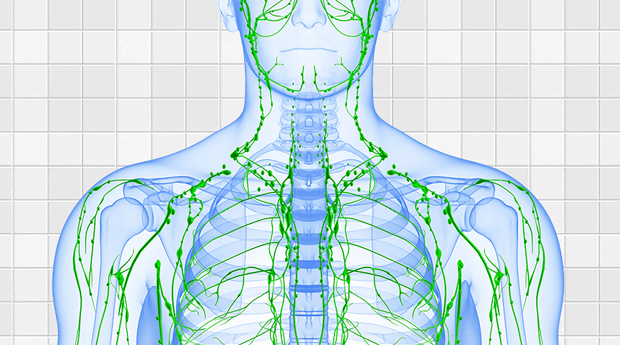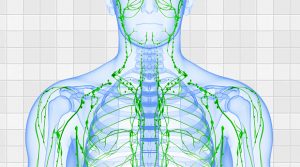How to Have a Healthy Lymphatic System
The lymphatic system includes your bone marrow, tonsils, adnoids, spleen, thymus, lymph nodes, and lymphatic vessels which are a web of very thin tubes that lay just beneath the surface of your skin. It is an independent circulatory system that works in partnership with your blood circulatory system as well as your immune system. Your lymphatic system provides a variety of immune functions that ward off infections, viruses, injury… and even cancer.
Lymphatic vessels lead into lymph nodes. The body has around 600 to 700 of these nodes concentrated in the groin, neck, armpits, around the heart, lungs, and intestines. The largest concentration of lymph tissue called gut-associated lymphatic tissue (GALT) surrounds the intestines and is made up of immune cells called lymphocytes.
It is important to emphasize that unlike blood circulation (propelled by the pumping action of the heart in many directions), lymphatic fluid flows primarily upwards towards the neck. The lymphatic system has no pump of its own and must rely on the movement of the body’s musculoskeletal system to circulate. In other words, as you move your body YOU become the pump.
Through movement, lymph fluid circulates and is able to do its many vital functions. There are a variety of self-help techniques you can do on a regular basis to keep your lymph system healthy and functioning efficiently.
4 Ways to Activate Your Lymphatic System
#1 – Movement
Lymphatic vessels are activated during movement of the musculoskeletal system. The main lymph vessels run up the legs, arms, and torso so moving these areas will move the most lymph. Studies show that daily moderate exercise significantly reduces recurrence risk for breast cancer, in part due to its effect on the lymphatic system. It is highly likely that it also provides a reduction in all cancers. Fortunately, exercise and physical activity come in many forms:
- Activitiessuch as dancing, gardening, climbing stairs, physical labor, household chores and others that require movement and the contraction and relaxation of muscles.
- Exercise and sports– walking (especially brisk walking while swinging your arms), running, biking, yoga, Pilates, tennis, golf, swimming, weight lifting, aerobics, jumping jacks, rope jumping, and many others.
- Rebounding– jumping up and down on a mini-trampoline. (More on this topic below)
If you love exercising, then that’s great. If you’re someone who does not, it’s important to do some type of physical activity. Pick something that you enjoy doing such as cycling, dancing, gardening, tennis, or golf. Consider finding a walking or exercise partner to make it fun and to hold one another accountable. Above all, it is important to make movement a regular part of your daily routine, just as you would eating and sleeping well.
#2 – Deep Diaphragmatic Breathing
While muscular movement clearly helps the lymphatic system, deep breathing is equally important. Dr. Jack Shields, a prominent lymphologist, conducted a study in 1979 that showed deep diaphragmatic breathing causes the lungs to press into the thoracic duct (after its purification by lymph nodes etc.) which presses the fluid from there back into the blood stream where it belongs. This relieves the pressure off of millions of check valves throughout the entire system.
Deep diaphragmatic breathing facilitates movement of lymph through the bloodstream and dramatically increases the elimination of toxins. It’s simple to do. Breathe deeply in through your nose and hold for four counts. Exhale through your mouth for two counts. As you get better at this, you can increase the time – for example breathe in for a count of five, hold for 20 counts and exhale for a count of 10.
Exhaling for twice as long as inhaling brings oxygen to the blood and activates the lymphatic system. Perform deep diaphragmatic breathing two or three times a session, three times a day. You can do this either sitting or lying down.
#3 – Rebounding
Rebounding is the equivalent to jumping up and down on a mini-trampoline. Because lymph fluid mostly runs vertically, certified lymphologists and reboundologists (yes, it is a real term) believe that vertical motion exercises such as rebounding are more effective for lymphatic actuation than horizontal motion exercises, such as walking, jogging or biking.
Vertical movements are perceived to be particularly effective in pumping lymph fluid because of the continuous contraction and subsequent relaxation of muscles, and the continuous compression and release of the connective tissues, and tissue spaces. It is with millions of one-way check valves that lymphatic fluids are kept moving in a consistent one-way direction.
The benefits of rebounding include:
- Activating lymphatic vessels while massaging vital organs and tissues, strengthening bones, and invigorating bone marrow
- Very little stress on the bones and joints (when using a therapeutic rebounder)
- Strengthening the tissues of the entire body including the heart muscle
- Facilitating profound body detoxification
- Encouraging deep breathing
- Actuating brain lymph and cerebral spinal fluid renewal
- Converting mechanical motion into electrical energy in the body for the magnification of thought waves, and boosting the endocrine system
Rebounding is fun and is not complicated. Bounce gently, run in place, dance, jump, perform jumping jacks (be sure you have adequate clearance); anything will do the job. Start with five minutes a day and work up to 20 or 30 minutes. Try to make this a daily habit or at least four or five times a week alternating with other movement activities.
Rebounders are available in sporting goods stores as well online, and come in a wide range of price points. If you’re unable to invest in a rebounder, skipping rope and jumping jacks are also vertical movements, but will place considerably more stress on your joints.
#4 – Dry Skin Brushing or Effleurage
Dry skin brushing helps to release toxins and stimulates the lymphatic system. Dry-skin brushing is best done first thing in the morning (before showering) because toxins are released and build up during sleep. Start with the soles of your feet and brush with upward strokes as you move up the legs and towards the heart. Do the same beginning with the hands up the arms. The routine is easy and should take you no more than 5-10 minutes.
You can dry skin brush daily, but do it a minimum of three times a week (and preferably five) for best results. A natural-bristled brush is best; avoid nylon and synthetic brushes because they can scratch and irritate your skin. Brushes can be purchased in any drugstore or online.
If you can, get one with a long handle that has a notch on the back of the brush to be able to insert the handle. A good option is to look for a brush with a strip of cloth attached to the back of the brush (to insert your hand) to be able to hold the brush better. If your brush does not have a long handle, you may want to employ the assistance of a partner for brushing your back.
Brushing the abdomen, chest, and neck is important too, but keep the strokes light to avoid damaging the skin.
This “tree of life” we call the lymph system is necessary to maintain health throughout your entire body and makes life and healing possible. Small efforts such as the 4 steps outlined above combined with eating whole organic food and drinking pure water can greatly affect the efficiency of your lymph system, and in turn will protect and defend your entire body.
Reference: Ty Bollinger, The Truth About Cancer




